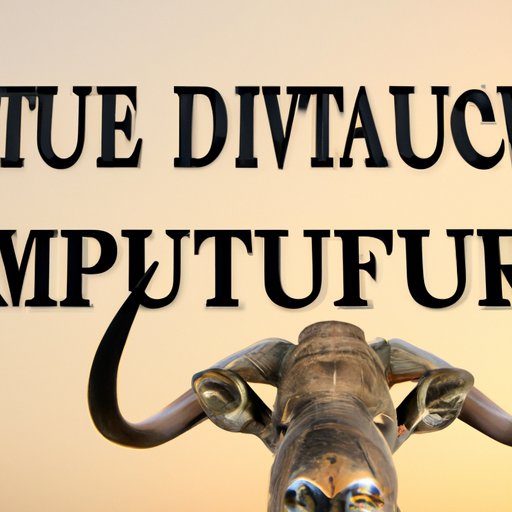Introduction
Trophy hunting is the practice of hunting wild animals for sport and taking their body parts or antlers as a trophy. It has been practiced for centuries, but in recent years it has become increasingly controversial. This article will explore the history of trophy hunting, its pros and cons, its impact on wildlife conservation, the ethical debate surrounding it, different cultural perspectives and its economic benefits.
A History of Trophy Hunting
The practice of trophy hunting can be traced back to ancient times when hunters would take the heads of their prey and mount them on walls as trophies. In more recent centuries, trophy hunting has evolved into an organized activity with hunters paying large sums of money to hunt big game animals such as elephants, lions, and rhinos. The aim of trophy hunting is to take home a “trophy” of the animal that was hunted, usually in the form of a mounted head, horns, tusks, or fur.

The Pros and Cons of Trophy Hunting
There are both pros and cons to the practice of trophy hunting. On the one hand, proponents argue that it provides important financial incentives for conservation efforts, as well as creating jobs and providing income for local communities. In addition, some view trophy hunting as a necessary tool for controlling animal populations, particularly in areas where they have become overpopulated.
On the other hand, opponents of trophy hunting argue that it can have devastating impacts on wildlife populations, particularly if it is not properly regulated. They point out that trophy hunting can disrupt animal migration patterns and lead to the depletion of certain species. In addition, there is the ethical issue of killing animals for sport, which many people find morally reprehensible.
Examining the Impact of Trophy Hunting on Wildlife Conservation
Trophy hunting has both positive and negative impacts on wildlife conservation. On the positive side, trophy hunting can provide financial incentives for conservation efforts by generating revenue from hunting fees. This money can be used to fund anti-poaching efforts and habitat protection measures. In addition, trophy hunting can help control animal populations in areas that have become overpopulated.
On the negative side, trophy hunting can have a detrimental effect on wildlife populations if it is not properly regulated. For example, overhunting can lead to the depletion of certain species, while disrupting animal migration patterns can have serious consequences for ecosystems. Furthermore, trophy hunting also raises ethical questions about the morality of killing animals for sport.

Exploring the Ethical Debate Surrounding Trophy Hunting
The debate around trophy hunting is highly charged and often divided along moral lines. Those who support trophy hunting argue that it provides much-needed funds for conservation efforts and can help control animal populations in areas where they are overpopulated. In addition, they point out that hunting is a part of human nature and has been practiced for centuries.
Those who oppose trophy hunting, however, argue that it is unethical to kill animals for sport. They point out that it can have devastating impacts on wildlife populations and disrupt delicate ecosystems. In addition, they argue that trophy hunting does not benefit local communities, as the profits from hunting fees often go to wealthy foreign hunters.

Understanding Trophy Hunting from a Cultural Perspective
It is important to understand that trophy hunting is viewed differently in different cultures. In some cultures, such as those of indigenous people, hunting can be a way of life and is seen as a means of connecting with nature and honoring the animals that are killed. In other cultures, such as those of industrialized nations, hunting is often seen as a sport and a way of displaying wealth and power.
Regardless of cultural differences, it is important to respect the knowledge and traditions of local communities when considering the issue of trophy hunting. Indigenous people often have a deep understanding of their environment and should be consulted before any decisions are made regarding the hunting of animals in their area.
Investigating the Economic Benefits of Trophy Hunting
Proponents of trophy hunting often cite the potential economic benefits of the practice. In theory, trophy hunting can generate revenue from hunting fees, which can then be used to fund conservation efforts and provide income for local communities. However, opponents of trophy hunting point out that the profits from hunting fees often go to wealthy foreign hunters, while the money that goes to local communities is often insufficient to make up for the loss of wildlife.
In addition, there is concern that trophy hunting could have long-term negative economic impacts. For example, if certain species become depleted due to overhunting, this could lead to a decrease in tourism, which would have a significant impact on local economies.
Conclusion
In conclusion, the practice of trophy hunting is highly controversial and has both positive and negative impacts on wildlife conservation. Proponents of trophy hunting argue that it provides financial incentives for conservation efforts and can help control animal populations in areas where they are overpopulated. Opponents, however, point out that it can have devastating impacts on wildlife populations and disrupt delicate ecosystems. In addition, there are ethical and cultural considerations to take into account when debating the issue.
When examining the economic benefits of trophy hunting, it is important to consider both the potential short-term gains and the potential long-term implications. Ultimately, it is important to take a holistic approach to the issue of trophy hunting and consider all the potential impacts before making any decisions.


